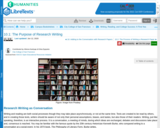
This source discusses the purpose of research writing.
- Subject:
- Composition and Rhetoric
- English Language Arts
- Material Type:
- Textbook
- Provider:
- LibreTexts
- Author:
- Athena Kashyap
- Erika Dyquisto
- Date Added:
- 06/01/2021

This source discusses the purpose of research writing.

The attached lesson plan is designed for 3rd grade English Language Arts students. Students will analyze informational text to determine the main ideas for a report, apply the concepts of the writing process, and communicate their research through an oral presentation to their classroom peers. This lesson plan addresses the following NDE Standards: NE LA 3.1.6.e, NE LA 3.2.1.a,c,d,e,j, NE LA 3.3.1.aIt is expected that this lesson plan will take five one-hour sessions to complete.

The ACS (American Chemical Society) citation style guide uses color-coded citation examples to assist chemistry students in converting MLA and APA citations to the ACS citation style. The MLA and APA citation styles are widely used in college courses, and many students are familiar with those styles. This guide makes citation in chemistry courses simple by giving examples of frequently referenced resources.
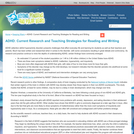
This article provides an overview of current research about attention deficit hyperactivity disorder as well as strategies to help students with ADHD with reading and writing.

This resource is a video abstract of a research paper created by Research Square on behalf of its authors. It provides a synopsis that's easy to understand, and can be used to introduce the topics it covers to students, researchers, and the general public. The video's transcript is also provided in full, with a portion provided below for preview:
"Healthy corneas are clear and lack blood vessels, but injuries like alkali burns can trigger neovascularization. This serious complication reduces the patient’s vision and is the leading cause of failure in corneal transplants. Previous studies have suggested that AIP1 (Apoptosis signal-regulating kinase 1-interacting protein) is involved in inflammatory neovascularization induction and that NOX4 (NADPH oxidase 4) is activated by alkali burns. NOX4 can produce reactive oxygen species (ROS) which unbalance the expression of the inflammation-related proteins NLRP3 and NLRP6 (NLR family pyrin domain containing 3 and 6). Researchers recently used a mouse model to examine how AIP1 and NOX4 are related to NLRP3/NLRP6 after corneal alkali burns. Corneal alkali burns decreased AIP1 expression and increased the expression of two pro-angiogenic proteins, clv-IL-1β (cleaved interleukin-1β) and VEGFa (vascular endothelial growth factor A)..."
The rest of the transcript, along with a link to the research itself, is available on the resource itself.
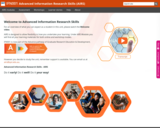
AIRS is an open source set of online modules and resources in research skills and knowledge. It provides the grounding in research processes with practical tools to support you.
AIRS is a mandatory coursework requirement for Higher Degree Research (HDR) students enrolled in a Doctor of Philosophy (PhD) or Master of Philosophy (MPhil), at the Queensland University of Technology (QUT).
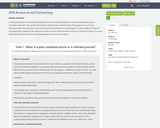
A strong foundation in science (including this social science) has always been an essential element of post-secondary education. The current White House administration demonstrates that people are much more impressionable when they don't have the critical tools to question so-called experts. Critical analysis of research has always been integral to the sciences, but with so much misinformation coming out of those in power, it is more important than ever to have a strong background in science and research.
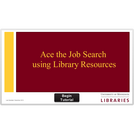
Learn how to research companies, industries and other critical business information to give you an edge in the job search process with this interactive tutorial.
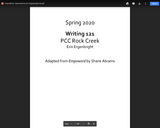
Adaptation of Empoword by Shane Abrams. Link to original text: https://pdxscholar.library.pdx.edu/pdxopen/20/
This adaptation slims down the original by cutting student texts, activities, assignments, and the metacognitive section. Intended for use as a reader.
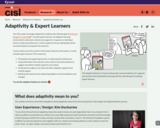
Find out how CISL is using adaptivity to promote expert learning.
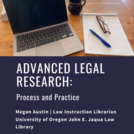
Written for students and instructors in an advanced legal research course, this book uses the steps of the legal research process to facilitate skills practice, collaboration, and reflection. It proposes a hypothetical as a basis for practicing the research process steps and encourages students and instructors to contribute other hypotheticals. The text also includes sample assignments, demonstration videos, and discussion and reflection questions, with opportunities for students and instructors to contribute additional questions. This text uses an approach that emphasizes student reflection on the development of research skills, with the benefit of repeated and consistent formative feedback.

14.461 is an advanced course in macroeconomics that seeks to bring students to the research frontier. The course is divided into two sections. The first half is taught by Prof. Iván Werning and covers topics such as how to formulate and solve optimal problems. Students will study fiscal and monetary policy, among other issues. The second half, taught by Prof. George-Marios Angeletos, covers recent work on multiple equilibria, global games, and informational fictions.

This course offers analysis and practice of various forms of scientific and technical writing, from memos to journal articles, in addition to strategies for conveying technical information to specialist and non-specialist audiences. Comparable to 21W.780 Communicating in Technical Organizations, but methods in this course are designed to deal with special problems of advanced ELS or bilingual students. The goal of the workshop is to develop effective writing skills for academic and professional contexts. Models, materials, topics and assignments vary from term to term.

This workshop is designed to help you write clearly, accurately and effectively in both an academic and a professional environment. In class, we analyze various forms of writing and address problems common to advanced speakers of English. We will often read one another’s work.
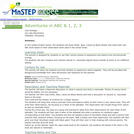
This activity is an indoor/outdoor activity that incorporates both literacy and scientific observation to make an ABC book based on Antler, Bear, Canoe by Betsy Bowen. Family participation is encouraged.
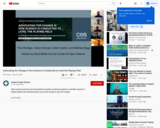
Open science practices have the potential to greatly accelerate progress in scientific research if widely adopted, but individual action may not be enough to...

Students will learn the research process by researching an African American Hero. They will use the Oregon Library Information System's 4 step process:1. Plan2. Find3. Create4. Present

This course examines the causes and consequences of American foreign policy since 1898. Course readings cover both substantive and methods topics. Four substantive topics are covered:
major theories of American foreign policy;
major episodes in the history of American foreign policy and historical/interpretive controversies about them;
the evaluation of major past American foreign policies–were their results good or bad? and
current policy controversies, including means of evaluating proposed policies.
Three methods topics are covered:
basic social scientific inference–what are theories? what are good theories? how should theories be framed and tested?
historical investigative methodology, including archival research, and, most importantly,
case study methodology.
Historical episodes covered in the course are used as raw material for case studies, asking “if these episodes were the subject of case studies, how should those studies be performed, and what could be learned from them?”
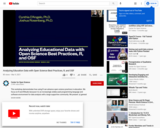
This workshop demonstrates how using R can advance open science practices in education. We focus on R and RStudio because it is an increasingly widely-used programming language and software environment for data analysis with a large supportive community. We present: a) general strategies for using R to analyze educational data and b) accessing and using data on the Open Science Framework (OSF) with R via the osfr package. This session is for those both new to R and those with R experience looking to learn more about strategies and workflows that can help to make it possible to analyze data in a more transparent, reliable, and trustworthy way. Access the workshop slides and supplemental information at https://osf.io/vtcak/.
Resources:
1) Download R: https://www.r-project.org/
2) Download RStudio (a tool that makes R easier to use): https://rstudio.com/products/rstudio/...
3) R for Data Science (a free, digital book about how to do data science with R): https://r4ds.had.co.nz/
4) Tidyverse R packages for data science: https://www.tidyverse.org/
5) RMarkdown from RStudio (including info about R Notebooks): https://rmarkdown.rstudio.com/
6) Data Science in Education Using R: https://datascienceineducation.com/
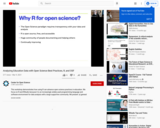
The webinar features Dr. Joshua Rosenberg from the University of Tennessee, Knoxville and Dr. Cynthia D’Angelo from the University of Illinois at Urbana-Champaign discussing best practices examples for using R. They will present: a) general strategies for using R to analyze educational data and b) accessing and using data on the Open Science Framework (OSF) with R via the osfr package. This session is for those both new to R and those with R experience looking to learn more about strategies and workflows that can help to make it possible to analyze data in a more transparent, reliable, and trustworthy way.